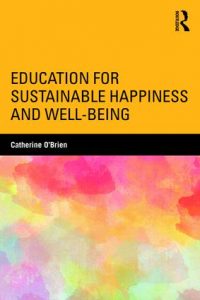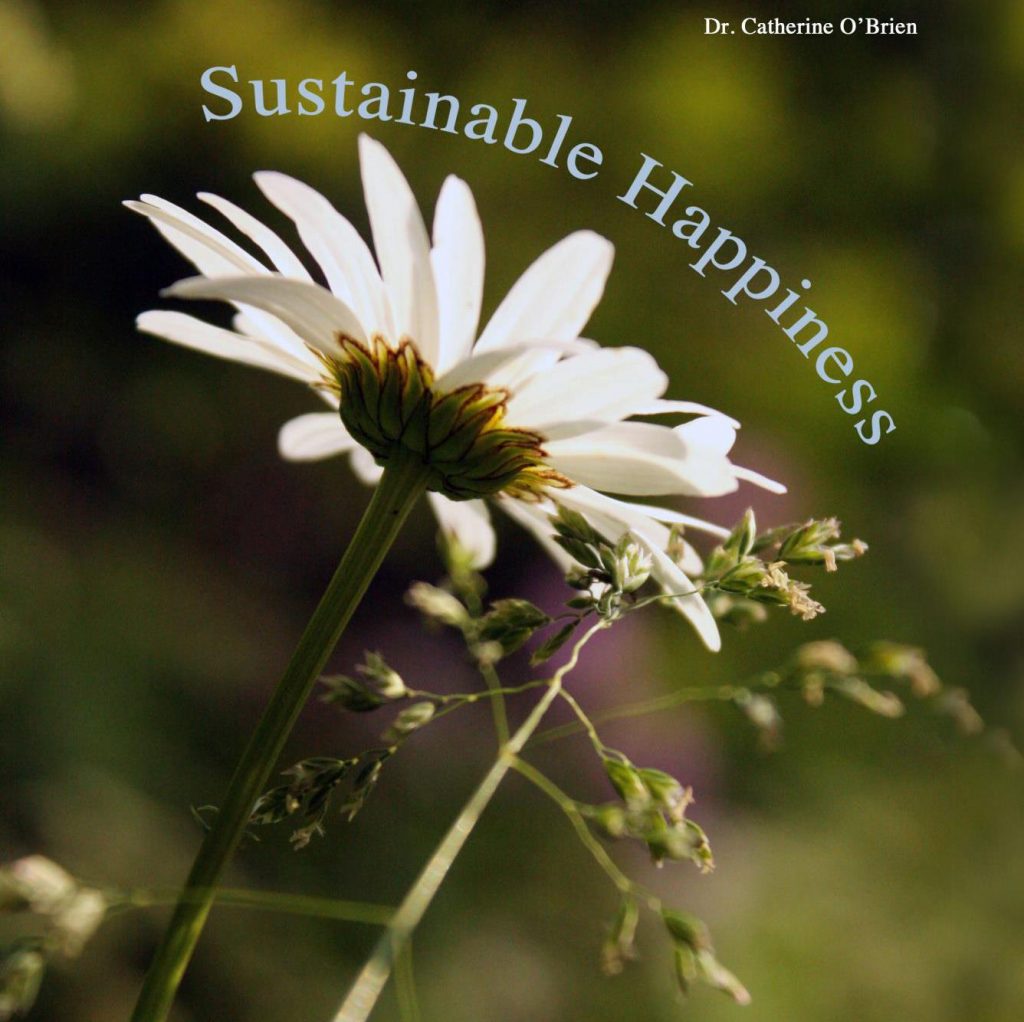In Ruchir Shama’s opinion piece last month, he wrote about recent efforts to move “beyond…
Well-Being For All, Sustainability
Sustainable “happiness contributes to individual, community and/or global well-being and does not exploit other people, the environment, or future generations.”
By Catherine O’Brien • June 23, 2016
Excerpt from Education for Sustainable Happiness and Well-Being
Why can’t I learn what I want to learn when I want to learn it? Why do I have to learn the same thing as everyone else, all at the same time? Sean Murray, age 8
 Eight year-old Sean already understands that the conveyor belt of learning that moves everyone along at the same pace is not engaging her. She has pinpointed one of the unfortunate structures that persist in our current approach to schooling. Yet, these are exciting times in education as we find active debates in education journals, books, blogs and conferences about how to transform education to meet 21st century learning needs, questioning the role of education and how to scale up the best practices of education leaders.[1] Traditional education is criticized for being outdated, stuck in patterns that were suitable for the Industrial Age (Hargreaves & Shirley, 2012; Robinson & Aronica, 2009, 2015; Zhao, 2012), too limited in our integration of technology (C21 Canada, 2012; Khan, 2012), or stifling creativity and innovation (Robinson, 2011; Wagner, 2012). Creativity, innovation, and entrepreneurship feature prominently in education transformation discussions. Proponents of 21st century learning (C21, 2012; P21, 2011) have recognized the value of developing competency or skills relevant to these three inter-related areas. The rationale offered for doing so range from enhancing individual well-being to securing national prosperity (Kelly, 2012; Kelley & Kelley, 2013; Robinson, 2011; Wagner, 2012; Zhao, 2012). Enterprise and entrepreneurship education are viewed by many as a vital contribution to reimagining education (European Union, 2013; Rae, 2010; Zhao, 2012). Unfortunately, on a very practical level, trying to infuse creativity, innovation and entrepreneurship into existing education frameworks that favor conformity is destined to mute the potential positive impact. Additionally, on a global level, the staggering level of youth unemployment poses a pressing challenge for educators to re-evaluate the very purpose of education, and ultimately how we should endeavor to meet our global learning needs (Zhao, 2012).
Eight year-old Sean already understands that the conveyor belt of learning that moves everyone along at the same pace is not engaging her. She has pinpointed one of the unfortunate structures that persist in our current approach to schooling. Yet, these are exciting times in education as we find active debates in education journals, books, blogs and conferences about how to transform education to meet 21st century learning needs, questioning the role of education and how to scale up the best practices of education leaders.[1] Traditional education is criticized for being outdated, stuck in patterns that were suitable for the Industrial Age (Hargreaves & Shirley, 2012; Robinson & Aronica, 2009, 2015; Zhao, 2012), too limited in our integration of technology (C21 Canada, 2012; Khan, 2012), or stifling creativity and innovation (Robinson, 2011; Wagner, 2012). Creativity, innovation, and entrepreneurship feature prominently in education transformation discussions. Proponents of 21st century learning (C21, 2012; P21, 2011) have recognized the value of developing competency or skills relevant to these three inter-related areas. The rationale offered for doing so range from enhancing individual well-being to securing national prosperity (Kelly, 2012; Kelley & Kelley, 2013; Robinson, 2011; Wagner, 2012; Zhao, 2012). Enterprise and entrepreneurship education are viewed by many as a vital contribution to reimagining education (European Union, 2013; Rae, 2010; Zhao, 2012). Unfortunately, on a very practical level, trying to infuse creativity, innovation and entrepreneurship into existing education frameworks that favor conformity is destined to mute the potential positive impact. Additionally, on a global level, the staggering level of youth unemployment poses a pressing challenge for educators to re-evaluate the very purpose of education, and ultimately how we should endeavor to meet our global learning needs (Zhao, 2012).
While there isn’t a one-size-fits-all package that will work for every country and school district, we are unlikely to gain traction in a healthier, more sustainable direction with the current multitude of visions for educational reform. Furthermore, many of these visions, have not incorporated sustainability and essentially aim to ensure that students are prepared for success in a fast changing world – presumably contributing to the outdated and unsustainable economic activity that prevails; a pattern that relies on the over consumption of non-renewable resources and environmental degradation. (The term sustainability in this book refers to the view that we must live equitably within the resource capacity of our planet). It could be argued that even the apparently most forward thinking visions will not adequately meet the needs of citizens in an era where climate change adaptation, and heightened threats to food security and water security are the rapidly emerging reality of our times (IPCC, 2014) unless sustainability is fully integrated through a repurposing of education (Hopkins, 2013). In contrast, if we are prepared to critically revisit the purpose of education for our modern context we will open the creative space for discovering how to meet our global learning needs.
[1] Parts of this chapter first appeared in: O’Brien, C. (2013). Who is teaching us about sustainable happiness and well-being? Health, Culture and Society, 5(1), 292-307. The use of this text complies with Creative Commons 4.0 International.If you are interested in exploring sustainable happiness, consider signing up for the online sustainable happiness course! It’s a great way to enhance your own happiness and wellbeing! There are 35 short videos (mini lectures) and 15 activities to deepen learning. These are also great resources for teaching about sustainable happiness. Use the coupon code SH4Teachers to get 50% off!

